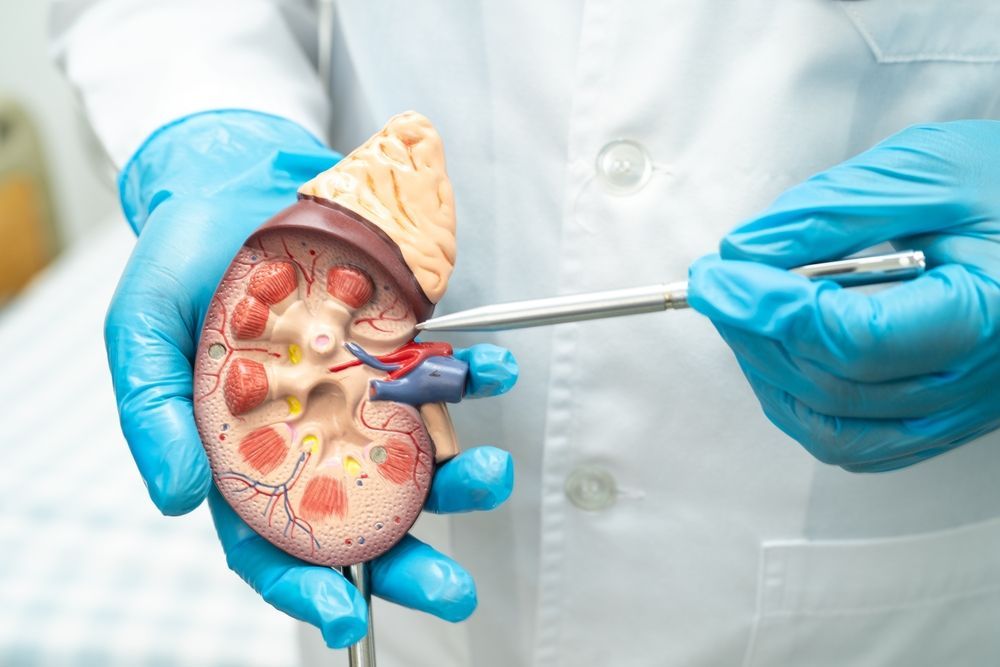Stage 4 Chronic Kidney Disease (CKD): Symptoms & Risks
Share this Article:
Written by: Vitality Dialysis

Stage 4 chronic kidney disease (CKD) indicates severe, irreversible damage to the kidneys. By this stage, the kidneys can only function between 29% and 15% of their optimal capacity. This is the last stage before total kidney failure (stage 5 CKD). Once a patient has reached stage 4 kidney disease, healthcare goals focus on slowing its progression to stage 5 and helping patients prepare for dialysis and kidney transplants as the disease progresses. Patients and family members also need to understand the symptoms and risk factors present with stage 4 kidney disease, as well as treatment options and how to get the most out of life despite CKD.
Understanding Stage 4 Chronic Kidney Disease (CKD)
With stage 4 kidney disease, a patient’s kidneys struggle to filter and clean toxins and waste products from the blood. The kidneys’ inability to perform these essential functions leads to significant damage to other organs, along with other troubling symptoms. If your healthcare provider’s testing finds that your kidneys’ glomerular filtration rate (GFR) is only 15-30 ml/min, this indicates that your kidneys are not able to effectively filter your blood and you have stage 4 kidney disease. Some of the most common causes of CKD include diabetes, high blood pressure, infections, heavy metal poisoning, traumatic kidney injury, and genetic disorders. In addition, chronic kidney disease can cause damage to other organs and systems within the body. For example, high blood pressure can damage the kidneys, and kidney damage can worsen blood pressure and weaken the heart. If you are diagnosed with stage 4 CKD, it is time to prepare for dialysis and kidney transplantation.
Symptoms & Early Indicators
The majority of patients with CKD are diagnosed somewhere during stage 3a or 3b when the kidneys are still functioning between 59% and 45% capacity. By then, kidney damage is already moderate and showing obvious symptoms of decline. If you notice any of the following symptoms, see your healthcare provider for urine and blood tests to check kidney capacity and function levels:
- Your urination habits change (more or less than usual, blood in the urine, foaminess)
- Persistent Fatigue
- Lower back pain
- Appetite changes
- Numbness and tingling in hands or feet
- Sleeping problems
- Your feet and/or hands are swelling
- You have unexplained itchy skin patches
- Muscle cramps
If you already have a diagnosis of diabetes, high blood pressure, or any other condition that could impact your kidneys, your healthcare provider needs to monitor your kidney health regularly to catch kidney decline before it worsens. Although CKD can be halted or slowed in earlier stages, once it declines to stage 4 kidney disease, health complications can become more serious. Some complications may include bone loss, anemia, and worsening high blood pressure.
If a patient reaches stage 4 kidney disease, all of the previously mentioned symptoms can worsen, but additional symptoms may also manifest, including:
- Inability to focus
- Chest pain
- Vomiting and nausea
- Difficulty breathing
- Additional swelling in extremities
- Worsening fatigue
- Breath smells of ammonia or urine
If you have any risk factors for chronic kidney disease, it’s important to continue monitoring your situation with your healthcare provider. Follow any treatment plan or lifestyle modifications your doctor recommends to slow or halt kidney decline.
Risk Factors & Causes
Diabetes and high blood pressure are the two most frequent causes of chronic kidney disease. Anyone with either or both of these diagnoses should carefully follow their healthcare provider's treatment plan to keep these conditions in check. This includes managing medications and making lifestyle modifications to reduce these risks as much as possible. Some of the other risk factors are less common but should also be monitored, including genetic conditions, injury to the kidneys, and exposure to heavy metal poisoning or other types of toxic exposure. Having obesity or a family history of CKD can also indicate an increased risk. Although not all of these risk factors and causes are controllable, patients who have a higher risk of CKD should focus on good nutrition, adequate hydration, good quality sleep, and regular physical activity to reduce their risks as much as possible.

Potential Complications of Stage 4 CKD
As the kidneys become unable to filter and clean the blood of toxins and waste products, these elements can damage other parts of the body, leading to additional complications. People who have reached stage 4 kidney disease have a higher risk of bone loss, which can lead to a higher risk of fractures. Anemia is also a complication of CKD, meaning that you have fewer red blood cells to carry oxygen and nutrients to all of your organs. High blood pressure can go even higher still, leading to worsening cardiovascular health and heart disease, placing stress on other organs, and causing an increased risk for strokes and heart attacks. Because there is no going back from stage 4 kidney disease, your healthcare provider will discuss the need to prepare for dialysis to help clean and filter your blood and potentially place you on a kidney transplant waiting list.
Diagnostic Approaches
If you have any risk factors or symptoms of chronic kidney disease, your doctor may order tests to verify what is going on with your kidneys. Typically, tests include evaluating physical symptoms, as well as blood and urine tests.
- eGFR blood tests—An “estimated glomerular filtration rate” blood test measures the level of creatinine in your blood. Creatinine is a waste product typically filtered out by the kidneys. This test measures these levels and calculates them along with your age, weight, height, gender, and ethnicity to arrive at a picture of how well or poorly your kidneys are working to clean and filter your blood. This is a reliable test for most people but can be unreliable for patients who are exceptionally muscular, overweight, pregnant, or younger than age 18. Blood tests can also help measure hemoglobin, phosphorus, and calcium levels.
- Urine tests—Urine tests measure and monitor elements expelled by your kidneys through the bladder as urine. Elevated levels of protein or blood can indicate problems with kidney function.
Your doctor will also want to use other tests to monitor any conditions that are risk factors for kidney disease, including diabetes and high blood pressure.

Management & Prevention Strategies
If CKD is diagnosed early enough, your doctor may recommend medical interventions and lifestyle modifications to slow or halt its progression to stage 4 kidney disease. This involves management and prevention strategies, including:
- Medications—Your doctor will need to monitor your medicine intake and kidneys because the kidneys are the organs that process and eliminate used medicines from your blood. If the kidneys are not working, medicines may build up in the blood. Nevertheless, certain medications such as ACE inhibitors, SGLT2 inhibitors, and/or nsMRAs might be prescribed to slow down CKD. Your healthcare provider might also prescribe a statin to prevent cholesterol buildup in your blood to lower your risk of stroke or heart attack. Your doctor may also urge you to avoid certain pain medications: non-steroid anti-inflammatory drugs (NSAIDs) like ibuprofen because they can stress the kidneys.
- Nutrition—Lowering salt intake below 2300 mg/day (or lower if advised by your doctor) is critical to stalling stage 4 CKD. Be sure to check food labels because many processed foods have a surprising amount of sodium in them. Your healthcare provider may recommend meeting with a dietitian to work out menu plans that will help your kidneys with ideal levels of vitamins, minerals, and protein.
- Lifestyle Modifications—Do all you can to minimize stress, get a healthy amount of sleep, and stay active. Even on dialysis, you can live an active life and follow an exercise plan approved by your doctor. If you smoke, please stop.
Patient Empowerment & Resources
Actively caring for your kidney health with your healthcare provider and using lifestyle management strategies to keep yourself healthy, you can live for many years, even with stage 4 kidney disease. If you’ve reached stage 4 CKD, work with your doctor on preparing to receive dialysis, which is critical to prolonging life, especially if your kidney disease progresses to stage 5 (kidney failure). Dialysis is a lifesaving treatment that can give patients a longer life span and help them live an active, healthier life, even with failing kidneys. People on dialysis can live anywhere between five and 30 more years, which is precious time spent with family and friends.
Live Freely with Vitality's Home Dialysis Treatments
Home dialysis with Vitality Dialysis not only helps you manage severe, late-stage kidney disease and kidney failure, but it also gives you control, convenience, confidence, and more choices about how you live your life. It saves you travel time and can even be done overnight while you sleep if this is the best option for you. You can continue to work and live life freely with Vitality’s home dialysis experts on your team.
Contact Vitality Dialysis today to learn more about your options for home dialysis.
Share with Us!







